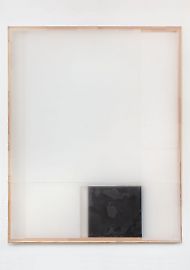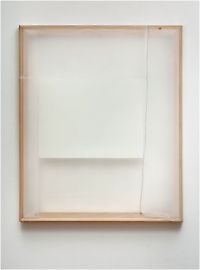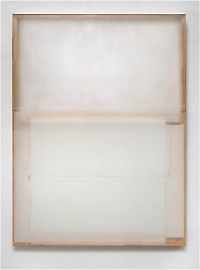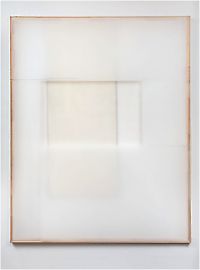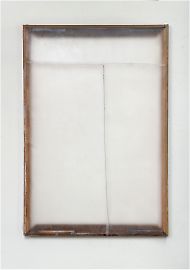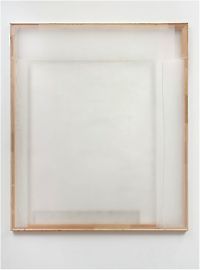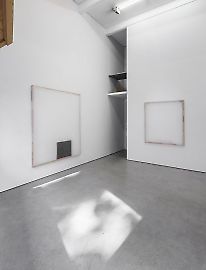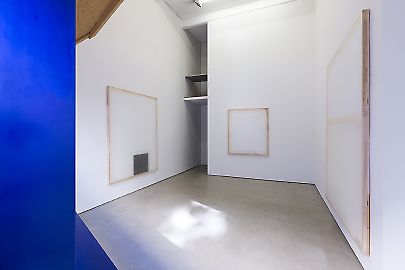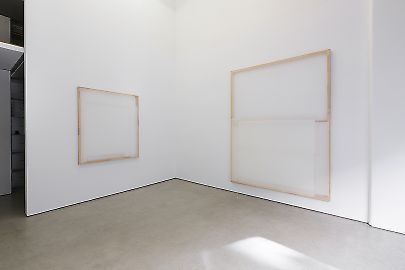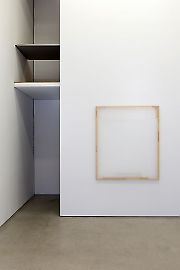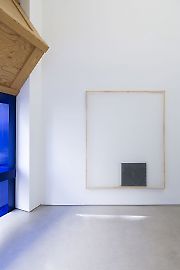Jaromir Novotny -- What a Painting Wants
Jaromir Novotny, Untitled, 2016, 200 x 160 cm, acrylic on synthetic organza, black glass insert, , Courtesy Georg Kargl Fine Arts, Vienna
Jaromir Novotny, Untitled (Cloud), 2016, acrylic on synthetic organza, sewing, 60 x 50 cm, Courtesy Georg Kargl Fine Arts, Vienna
Jaromir Novotny, Untitled (Remains), 2016, acrylic on synthetic organza, sewing, 240 x 180 cm, Courtesy Georg Kargl Fine Arts, Vienna
Jaromir Novotny, Untitled, 2016, acrylic on synthetic organza, acrylic on fiberboard insert, sewing, 200 x 160 cm, Courtesy Georg Kargl Fine Arts, Vienna
Jaromir Novotny, Untitled (Rising Line), 2016, acrylic diespersion on synthetic organza, sewing, 58 x 40 cm, Courtesy Georg Kargl Fine Arts, Vienna
Jaromir Novotny, Untitled (Still Life), 2016, acrylic on synthetic organza, sewing, acrylic glass, 140 x 120 cm, Courtesy Georg Kargl Fine Arts, Vienna
Jaromir Novotny, What a Painting Wants, 2016, Ausstellungsansicht, Foto: Matthias Bildstein, courtesy Georg Kargl Fine Arts, Wien
Jaromir Novotny, What a Painting Wants, 2016, Ausstellungsansicht, Foto: Matthias Bildstein, courtesy Georg Kargl Fine Arts, Wien
Jaromir Novotny, What a Painting Wants, 2016, Ausstellungsansicht, Foto: Matthias Bildstein, courtesy Georg Kargl Fine Arts, Wien
Jaromir Novotny, What a Painting Wants, 2016, Ausstellungsansicht, Foto: Matthias Bildstein, courtesy Georg Kargl Fine Arts, Wien
Exhibition duration: 9 September – 5 November 2016
The show What A Painting Wants by the young Czech painter Jaromír Novotny is his first solo
exhibition at Georg Kargl BOX, however not the first time his works are shown at the gallery.
Several pieces of his series using synthetic organza were included in the group exhibition
TRANSPARENCY at Georg Kargl Fine Arts in 2015. Now at the BOX, the artist shows three works
from 2016 from the same series on an even lighter tone. On the question of what a painting wants,
the artist’s statement below gives an insight of a possible answer:
A painting is something artificial, yet even so it is naturally self-evident to the highest
possible degree. As if it originated by itself, without any effort on my part. This peculiar
detachment provokes my curiosity and engagement. Even given the enticing notion
that “aural depictions of the past often consist of objects produced in such a way that
they are not in fact ‘the work of human hands’”[1], I maintain an awareness of the
painting as a thing, an object that is “manufactured”. Working within certain rigidly
defined guidelines and the consideration and acceptance of random processes
together form a single whole. At the same time I consider verticality (of format,
composition) and a scale of 1:1 (human figure: painting) to be constant parameters of
a certain “basic (default) setting” with respect to the perceiving viewer. On this
background, the paintings “reveal” their essential properties, whose values reach
slightly above zero, i.e. cross over the boundary of visibility. These include a limited
range of colours which seem to arise from white only, as well as the depiction of the
surface of the painting, which appears to be only just detaching itself from the surface
of the canvas, as if it were some kind of initial “motif” of painting itself, appearing
almost to blend both with the surface and the format of the painting-object. The
process outlined is not necessarily unidirectional – it may concern extinction as well as
creation. Withdrawal / advancement. In any case, however, at stake is movement
within a narrowly delimited “phase” of minimal visible transformations (of colour
scheme, composition) which also give rise to an important “functional” aspect of these
paintings consisting of making the medium of painting visible. A minimal mutual
differentiation seems to be a general and basic process here, on the backdrop of
which it is possible to materialise – or at the very least point to – certain variables of
time and space and in particular their resultant phenomenon – a place. Standing in
front of a painting, I sense the existence of here and now with the awareness,
however, that “Now is the inner image of the Past.”[2]
[1] Georges Didi-Huberman, Devant le Temps / Before Time
[2] „das Jetzt das Innerste Bild des Gewesenen“, Walter Benjamin, Das Passagen-Werk / Arcades Project
Jaromír Novotný, born 1974 in Český Brod, Czechoslovakia, lives and works in Prague. His works
were presented in solo shows at Georg Kargl BOX (2016), Geukens & De Vil, Antwerp (2016), The
Gdańsk City Gallery, Gdańsk (2015), Art Basel Miami Beach/Positions, solo with hunt kastner
(2015), Art Brussels, solo with Geukens & De Vil (2015), Bílý nástěnka, Školská 28 Communication
Space, Prague (2014), k.art.on, Karlin studios, Prague (2014), Galerie Na shledanou, Volyně
(2013), City Gallery Prague (2012), Kolumba (Kunstmuseum des Erzbistums Köln), Raum 10,
Cologne (2012), Galerie SPZ, Prague (2011), Geukens & De Vil, Knokke (2011), Jiri Svestka Berlin
(2010), Jiri Svestka Gallery, Prague (2009), Geukens & De Vil, Antwerp (2009), Jiří Jílek Gallery,
Šumperk (2008), Dole Gallery, Ostrava (2008), Felix Jenewein Municipal Gallery, Kutná Hora
(2007), Via Art Gallery, Prague (2004).


